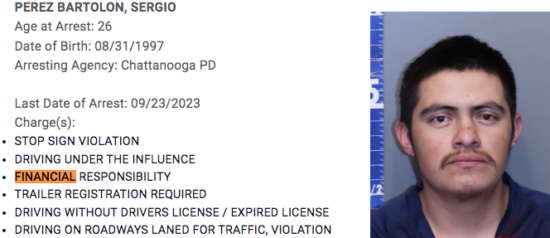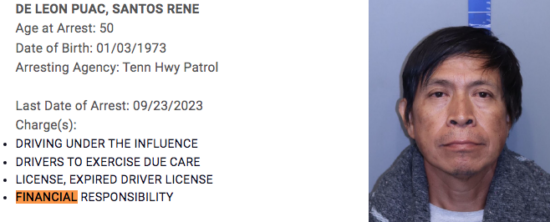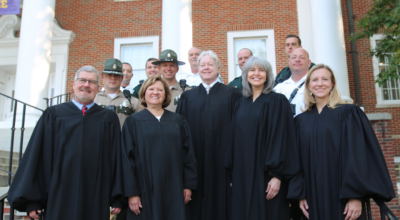
This bus crash kills one person, highlighting the rationale for regulation of traffic. Tennessee regulates transportation in the public interest, because haulers and bus operators make private profit off the public roads and impose risks on the traveling public. Buses, trucks are all registered as motor vehicles so they can be brought under state authority. (Photo YouTube)

Brad Buchanan has been working for the Tennessee revenue department for nearly a year, having 18 years behind him as a state tax attorney. (Photo Brad Buchanan)
CHATTANOOGA, Tenn., Sunday, Oct. 1, 2023 — My prosecution of Tennessee commissioner David Gerregano in his revenue department focuses initially on getting rid of a department employee assigned as hearing officer or judge.
By David Tulis / NoogaRadio Network
Brad Buchanan has handled initial filings and pre-hearing conferences in Tulis v. Department of Revenue, seeking to overturn revocation of the registration of my 2000 Honda Odyssey minivan. I am victim of an arbitrary and capricious program of commercial government that flatly contradicts state law at T.C.A. § 55-12-101 et seq.
I have filed notice of deposition of the commissioner, and his department attorney has filed a motion to quash. But the first order of business is whether Mr. Buchanan can be objective and remain as administrative hearing officer.
My grounds for booting him are powerful.
The uniform administrative procedures act, at Title 4 in the Tennessee code annotated, prohibits a person who is subject to the authority of one who is prosecuting a contested case from being an administrative judge in the same proceeding.
A person who is subject to the authority, direction or discretion of one who has served as investigator, prosecutor or advocate in a contested case may not serve as an administrative judge or hearing officer or assist or advise an administrative judge or hearing officer in the same proceeding.
Tenn. Code Ann. § 4-5-303
While I am prosecutor of the case for a contested case, the petitioner is in fact a defendant in the administrative action to revoke his registration for not having insurance. He is being prosecuted by the commissioner under the Tennessee financial responsibility act of 1977.
If a report of the accident is not received by the commissioner of safety within twenty (20) days, as required by subsection (a), the commissioner may issue a notice of suspension of the operator’s license and, immediately upon request by the commissioner of safety, the commissioner of revenue shall issue a notice of suspension of the registration of the motor vehicle involved.
Tenn. Code Ann. § 55-12-104
The Tennessee supreme court rules on conflict of interest emphasize that recusal is in order even if there is an appearance of bias. The problem of appearance of fairness is strong in this case seeking to overthrow a second supporting root of the Jim Crow tree trunk. The main tree trunk is ultra vires enforcement of Title 55, motor and other vehicles, and first main supporting root is violation of T.C.A. § 40-7-103, warrantless arrest by officer.
Even if there were no clear UAPA rule on conflict of interest, a central issue is the appearance of bias under Rule 10, with the novelty and scale of the case a strong prop for my recusal demand in the interest of appearance of justice and public confidence in Tennessee judicial proceedings.

Camille Cline, revenue department attorney
If the UAPA ban were insufficiently clear, Rule 10 in the code of judicial conduct states “A judge shall uphold and promote the independence, integrity, and impartiality of the judiciary, and shall avoid impropriety and the appearance of impropriety,” Canon 1, and “shall comply with the law, including the Code of Judicial Conduct,” Rule 1.1, and “shall act at all times in a manner that promotes public confidence in the independence, integrity, and impartiality of the judiciary, and shall avoid impropriety and the appearance of impropriety” Rule 1.2.
A claim of appearance of bias is more easily reached than a showing of actual likely bias or non-independence alleged against a judge or hearing officer. The reasonable person standard holds that, if it looks to an ordinary reasonable person like a judge might be biased or likely to be compromised, grounds for disqualification exist. The reasonable person would be one on a petit jury.
The UAPA rule prohibits the ill appearance of the master-servant relation implied in the hiring pecking order in the department. Cmsr. Gerregano is the top boss with the midlevel management tax dispute officer Buchanan “subject to [his] authority, direction or discretion.”
I argue that it is requisite my case protect the judicial function from scandal and public doubt about the administration of justice. The department’s hearing officer’s servicing of this case must uphold (1) the UAPA ban at § 4-5-303 and, (2) the reputation of courts and judicial authority. Not the petitioner, but statute and canon dictate recusal.
Hoping for the final word on recusal, I suggest in a third filing on the matter, “The claim of appearance of bias becomes clear in eyeing the nature of instant case. Petitioner seeks to junk a program in a case with no precedent, and petitioner demands a hearing officer who is in fact as neutral as he appears.”
Phone negotiations set
On Thursday I call Gerregano attorney Camille Cline and ask if she is willing to review one or two key provisions of the law to explain how Mr. Gerregano accounts for them in his policy. The UAPA rules urge parties to talk prior to the main hearing and reduce areas of dispute.


Sergio Perez Bartolon, top photo, and Santos Rene de Leon Puac are victims of a vicious program in Tennessee, led by the department of revenue, to prosecute as criminals people who don”t carry insurance while using the people’s roads. A qualifying accident is the only way a person can become subject to the statute at T.C.A. 55-12-101 et seq. (Photos from Chattanoogan.com)
The kommissar enforces the Tennessee financial responsibility act of 1977 as if it were the Tennessee compulsory insurance act of 1977, which it is not, and which was not passed ever by the general assembly. The abuse upon the traveling public arises from policy, and not from the law itself. The policy, serving the insurance industry with F$2.6 billion in premiums per year from Tennessee drivers and operators, is without legal foundation.
The senior associate counsel at the department and I set a time to talk over Mr. Gerregano’s weak points, and my strong — that being the law itself. The department relies on a 2003 attorney general opinion, edits to sect. 139 penalty provision of the law, the title of the statute which includes the word “compliance,” among other claims likely ahead. What has been offered thus far to show me I’m wrong are not legal authority, but opinion.
Mrs. Cline says she has done extensive historical research into the legislative record regarding updates to the TFRA, required when a provision is “ambiguous.” These evidence of legislative intent will be unavailing if no vote actually changed the law itself. Superficial edits don’t alter the statutory infrastructure. Short-cuts fail to rewrite the whole law to make Tennessee a mandatory insurance state.
I have indicated that Cmsr. Gerregano’s actions to arrest and criminally accuse tens of thousands of Tennesseans every year is a criminal act, violating numerous state and federal guarantees of protection against lawless abuse.
Fall into their own trap
Several “gnomes” in Tennessee are ally with me in prosecuting this case. Says Levi Thurston, a Tennessee man working as a field hand near Mertens, Texas:
Emotive reasoning is our usual filter, as much as possible just read as work of literature. Just what are they telling us, what is on their mind, good or bad they will tell you and just let them speak their mind there on the page. They eventually fall into the pit they have dug for others. Stay with the narrative because their narrative will self-contradict and the contradictions come especially in the “as applied” because they have to eventually abandon the rule of law to force their agenda. That is why depositions are so hazardous. It’s very difficult to speak the truth when their real masters are the money masters — not the purposes the office was created and erected. These people are involved in plunder; it’s very hard to pivot or break away from that mindset.
They’re not there to serve the public. “A double-minded man is unstable in all his ways.” Your efforts are to make them admit, especially to themselves, the errors of their ways, refusing to follow the law as written.

David Tulis’ investigative and contrarian “Tulis Report” airs every morning at 7 a.m. in Chattanooga, also live on Facebook at TNtrafficticket and on Rumble at Noogaradionetwork. (Photo David Tulis)
Mid-state bureau chief Christopher Sapp is concerned that such interactions will help Mrs. Cline better coach Cmsr. Gerregano for his deposition. Mr. Sapp doesn’t want me to tip my hand. My answer is that the law talks to him every day; the law itself should prep Mr. Gerregano to know how I will approach my queries upon him in person, and that since I am fighting to uphold the law, all his cues are from the lawbook itself.

